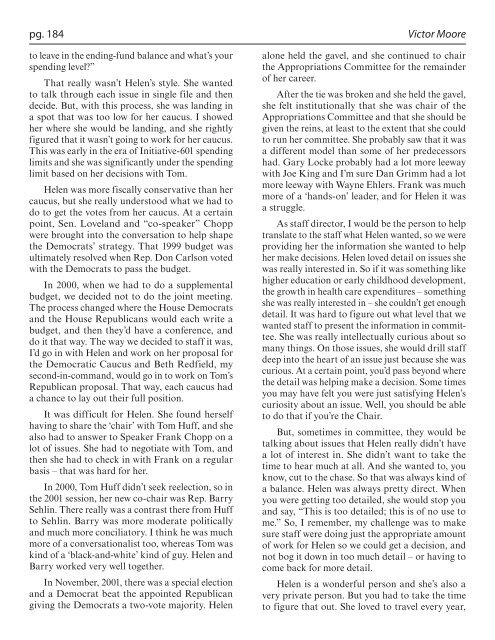Helen Sommers: An Oral History
Helen Sommers: An Oral History
Helen Sommers: An Oral History
You also want an ePaper? Increase the reach of your titles
YUMPU automatically turns print PDFs into web optimized ePapers that Google loves.
pg. 184 Victor Moore<br />
to leave in the ending-fund balance and what’s your<br />
spending level?”<br />
That really wasn’t <strong>Helen</strong>’s style. She wanted<br />
to talk through each issue in single file and then<br />
decide. But, with this process, she was landing in<br />
a spot that was too low for her caucus. I showed<br />
her where she would be landing, and she rightly<br />
figured that it wasn’t going to work for her caucus.<br />
This was early in the era of Initiative-601 spending<br />
limits and she was significantly under the spending<br />
limit based on her decisions with Tom.<br />
<strong>Helen</strong> was more fiscally conservative than her<br />
caucus, but she really understood what we had to<br />
do to get the votes from her caucus. At a certain<br />
point, Sen. Loveland and “co-speaker” Chopp<br />
were brought into the conversation to help shape<br />
the Democrats’ strategy. That 1999 budget was<br />
ultimately resolved when Rep. Don Carlson voted<br />
with the Democrats to pass the budget.<br />
In 2000, when we had to do a supplemental<br />
budget, we decided not to do the joint meeting.<br />
The process changed where the House Democrats<br />
and the House Republicans would each write a<br />
budget, and then they’d have a conference, and<br />
do it that way. The way we decided to staff it was,<br />
I’d go in with <strong>Helen</strong> and work on her proposal for<br />
the Democratic Caucus and Beth Redfield, my<br />
second-in-command, would go in to work on Tom’s<br />
Republican proposal. That way, each caucus had<br />
a chance to lay out their full position.<br />
It was difficult for <strong>Helen</strong>. She found herself<br />
having to share the ‘chair’ with Tom Huff, and she<br />
also had to answer to Speaker Frank Chopp on a<br />
lot of issues. She had to negotiate with Tom, and<br />
then she had to check in with Frank on a regular<br />
basis – that was hard for her.<br />
In 2000, Tom Huff didn’t seek reelection, so in<br />
the 2001 session, her new co-chair was Rep. Barry<br />
Sehlin. There really was a contrast there from Huff<br />
to Sehlin. Barry was more moderate politically<br />
and much more conciliatory. I think he was much<br />
more of a conversationalist too, whereas Tom was<br />
kind of a ‘black-and-white’ kind of guy. <strong>Helen</strong> and<br />
Barry worked very well together.<br />
In November, 2001, there was a special election<br />
and a Democrat beat the appointed Republican<br />
giving the Democrats a two-vote majority. <strong>Helen</strong><br />
alone held the gavel, and she continued to chair<br />
the Appropriations Committee for the remainder<br />
of her career.<br />
After the tie was broken and she held the gavel,<br />
she felt institutionally that she was chair of the<br />
Appropriations Committee and that she should be<br />
given the reins, at least to the extent that she could<br />
to run her committee. She probably saw that it was<br />
a different model than some of her predecessors<br />
had. Gary Locke probably had a lot more leeway<br />
with Joe King and I’m sure Dan Grimm had a lot<br />
more leeway with Wayne Ehlers. Frank was much<br />
more of a ‘hands-on’ leader, and for <strong>Helen</strong> it was<br />
a struggle.<br />
As staff director, I would be the person to help<br />
translate to the staff what <strong>Helen</strong> wanted, so we were<br />
providing her the information she wanted to help<br />
her make decisions. <strong>Helen</strong> loved detail on issues she<br />
was really interested in. So if it was something like<br />
higher education or early childhood development,<br />
the growth in health care expenditures – something<br />
she was really interested in – she couldn’t get enough<br />
detail. It was hard to figure out what level that we<br />
wanted staff to present the information in committee.<br />
She was really intellectually curious about so<br />
many things. On those issues, she would drill staff<br />
deep into the heart of an issue just because she was<br />
curious. At a certain point, you’d pass beyond where<br />
the detail was helping make a decision. Some times<br />
you may have felt you were just satisfying <strong>Helen</strong>’s<br />
curiosity about an issue. Well, you should be able<br />
to do that if you’re the Chair.<br />
But, sometimes in committee, they would be<br />
talking about issues that <strong>Helen</strong> really didn’t have<br />
a lot of interest in. She didn’t want to take the<br />
time to hear much at all. <strong>An</strong>d she wanted to, you<br />
know, cut to the chase. So that was always kind of<br />
a balance. <strong>Helen</strong> was always pretty direct. When<br />
you were getting too detailed, she would stop you<br />
and say, “This is too detailed; this is of no use to<br />
me.” So, I remember, my challenge was to make<br />
sure staff were doing just the appropriate amount<br />
of work for <strong>Helen</strong> so we could get a decision, and<br />
not bog it down in too much detail – or having to<br />
come back for more detail.<br />
<strong>Helen</strong> is a wonderful person and she’s also a<br />
very private person. But you had to take the time<br />
to figure that out. She loved to travel every year,
















